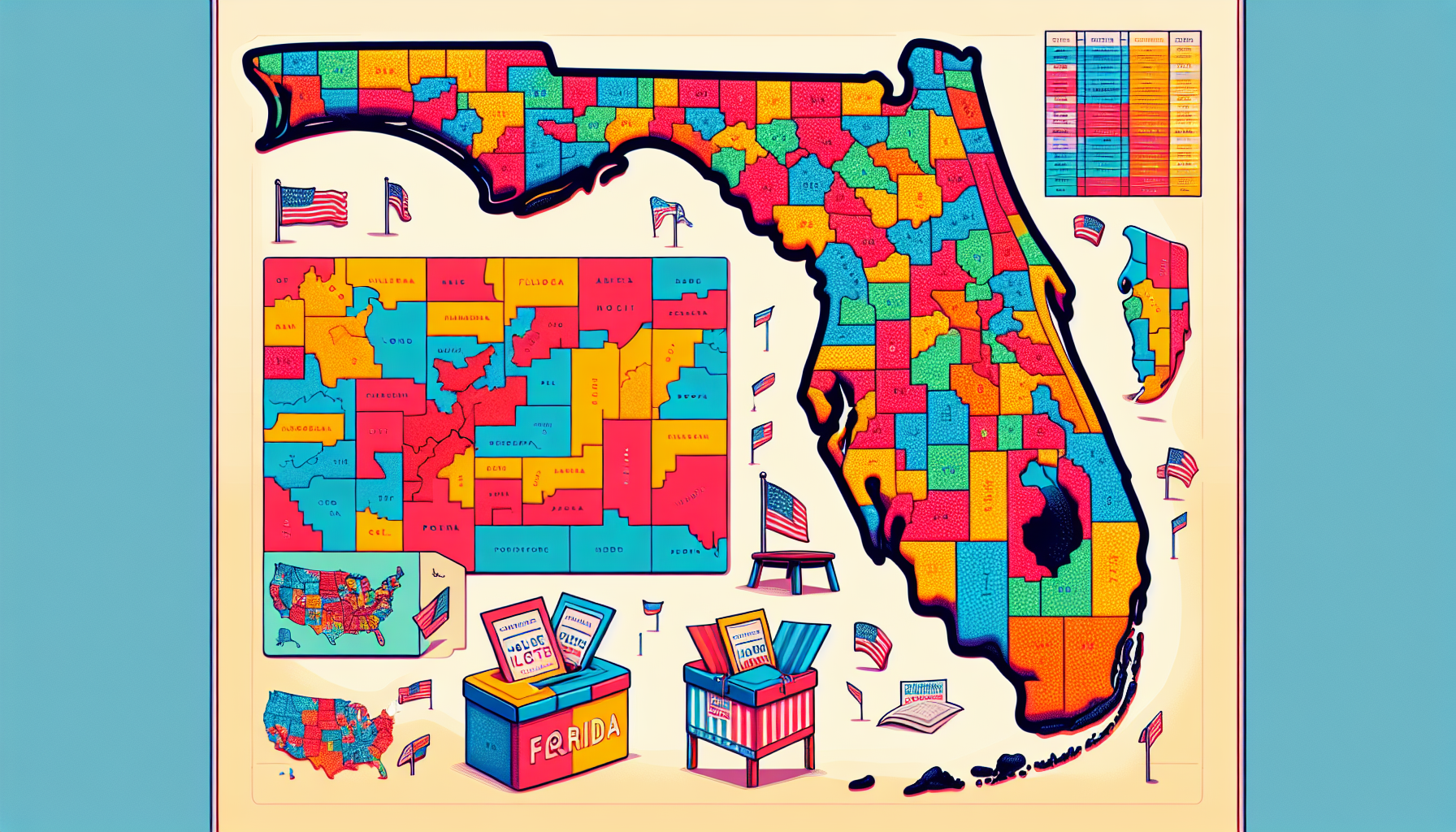Curious about when you can cast your vote in Florida’s House District elections? Staying updated on your local elections is crucial because these decisions directly impact your community. Let’s break down the upcoming Florida House District elections, including when they will occur and what you need to know to participate.

Understanding Florida’s House Districts
In Florida, the House of Representatives is a vital part of the state legislature. This body is responsible for creating laws that affect your daily life—from education to healthcare to transportation. Each district elects one representative, and your representative plays a crucial role in voicing the concerns of your community at the state level.
The Structure of Florida’s House
Florida’s House of Representatives is composed of 120 members. Each district encompasses a specific geographical area, ensuring that diverse populations within the state are represented.
- Each district typically has around 158,000 residents.
- The lines that define these districts can change with the census, which occurs every ten years.
The most recent redistricting, following the 2020 census, established the boundaries for the upcoming elections.
Schedule of Elections
So, when are the next House District elections? Mark your calendars! The next elections will take place on November 8, 2022, which is a key date for voters.
Special Elections in 2023
It’s also worth noting that Florida may hold special elections for House districts if a representative resigns or passes away before their term ends. These elections can happen at any time, so it’s essential to stay informed about current events that might lead to these special circumstances.
Voting Process in Florida
Participating in the election is more than just knowing when it is. You want to ensure you’re ready to cast your vote effectively. Here’s a simplified breakdown of how the voting process works in Florida.
Registering to Vote
Before you can vote, you must be registered. Registration in Florida can be done online, by mail, or in person. Your registration must be completed at least 29 days before the election.
- Online: Visit the Florida Division of Elections website
- By mail: Complete a registration form and send it to your local Supervisor of Elections
- In person: Go to your local Supervisor of Elections office or designated locations
Checking Your Registration Status
To ensure you’re ready to vote, check your registration status. You can do this through the Florida Division of Elections website.
Voting Methods
Florida offers several options for how you can vote:
- In-person on Election Day: You get to vote at your designated precinct.
- Early Voting: This period allows you to vote at select locations before Election Day, typically starting 15 days prior and ending 2 days before the election.
- Vote by Mail (Absentee Voting): You can request a mail-in ballot and send your vote from the comfort of your home. Just be aware of the deadlines to request your ballot and return it by mail.
The Importance of Local Elections
You might wonder, why are these elections important? Local elections, including those for House District representatives, allow you to influence the state legislature directly. Here’s why they matter:
Your Voice Matters
Representatives from your district advocate for your community’s needs and concerns. Engaging in these elections gives you the chance to voice your preferences on issues that matter most to you.
Impact on Local Policies
House representatives contribute to forming laws that affect various aspects of your life, from education funding to healthcare policies. Your vote helps decide who will represent your interests in the state capital.
Civic Responsibility
Voting is a civic duty that helps sustain democracy. Your participation in local elections strengthens the entire electoral process and encourages others to take part.

Examining the Candidates
With the elections approaching, you might be curious about who the candidates are. Knowing who is running for the House seat in your district will empower you to make informed choices.
Researching Candidates
Candidates usually announce their intentions to run a few months before the election. Here are some ways to learn more about them:
- Campaign Websites: Visit their official websites for information on their platforms and priorities.
- Social Media: Candidates often use social media to engage with voters and share their views.
- Local News: Keep an eye on local news outlets that cover the election landscape. They often highlight candidate interviews and debates.
Engaging with Candidates
You may have opportunities to engage with candidates through town hall meetings, debates, and forums. Attend these events to ask questions, voice your concerns, and better understand who would best represent you.
Voting Rights in Florida
Understanding voting rights is essential to ensure you can participate in the election without any issues. In Florida, there are various laws designed to protect your right to vote.
Voter ID Requirements
Florida has a voter identification law requiring you to present an acceptable form of ID when you vote. Here are some valid forms of ID:
- Florida driver’s license
- Florida identification card issued by the Department of Highway Safety and Motor Vehicles
- U.S. passport
If you don’t have any of these IDs, be sure to seek alternatives that may also be accepted.
Accessibility
Florida takes pride in ensuring that all citizens, including those with disabilities, can vote. Polling places must be equipped with accessibility features, and provisions exist for assistance as needed.
Preparing for Election Day
As the election day approaches, preparation becomes key to ensuring a smooth voting experience.
Review Your Sample Ballot
Your local Supervisor of Elections will usually send out a sample ballot a few weeks before the election. Reviewing it will help you understand the candidates and any referendums or amendments on the ballot.
Plan Your Voting Method
Decide whether you will vote in person on Election Day, take advantage of early voting, or opt for vote by mail. Make sure you’re clear on the locations, times, and any necessary preparations.
Important Dates to Remember
Here’s a quick reference table to help you keep track of important dates related to the upcoming elections:
| Event | Date |
|---|---|
| Voter Registration Deadline | October 11, 2022 |
| Early Voting Period | October 22 – November 5, 2022 |
| Election Day | November 8, 2022 |
| Vote by Mail Request Deadline | October 25, 2022 |
| Mail Ballot Return Deadline | November 8, 2022 (by 7 PM) |
After the Election: Understanding the Results
Once the polls close, you may be eager to know the election results. Florida has a robust process for counting and reporting votes, but it can take some time.
How Votes are Counted
Election officials work diligently to ensure every vote is counted accurately. The counting of votes begins as soon as polls close, but initial results may be unofficial and subject to verification.
Seeking Results
You can track the election results through the Florida Division of Elections website, local news outlets, or your county’s Supervisor of Elections website.
The Role of Political Parties
Political parties play a significant role in disseminating information about candidates and shaping campaigns. Understanding party platforms can help you make more informed decisions.
Party Platforms
Each political party generally has a platform that outlines its stance on various issues. Familiarizing yourself with these can provide context for the candidates’ positions.
Engaging with Parties
If you align with a particular political party, consider engaging with them through events or meetings. This involvement can help you find community resources and support networks related to the election.
Your Responsibility as a Voter
Ultimately, your role as a voter doesn’t end on election day. It’s crucial to stay informed and engaged throughout the term of your elected representatives.
Following Up on Elected Officials
After the election, check in on how your elected officials are performing. Attend town hall meetings, read local news, and stay connected to advocacy groups to understand the impact of their decisions on your community.
Advocating for Change
If you notice issues or concerns arising from decisions made by your representatives, don’t hesitate to voice your concerns. Writing letters, making phone calls, or participating in local activism can let your representative know what matters to you.
Conclusion
Being informed about the upcoming Florida House District elections, the voting process, and the importance of your participation is essential for the health of your democracy. By understanding the candidates, preparing ahead of time, and making your voice heard, you’re playing a valuable role in shaping policies that affect your life.
So, mark your calendar for November 8, 2022, and prepare to make your vote count! Stay engaged with your community, keep an eye on local news, and don’t hesitate to reach out for more information if needed. Your participation is what makes democracy thrive.
